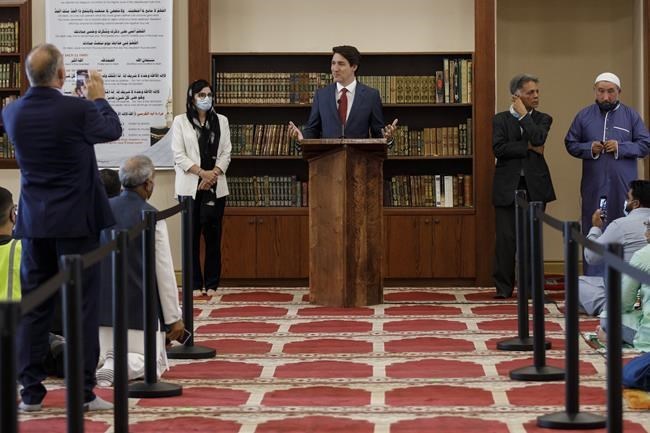OTTAWA — Prime Minister Justin Trudeau called out federal security and tax agencies during a national summit on Islamophobia, saying they must do more to put an end to anti-Muslim sentiments in Canada.
Speaking to the meeting organized by the government, Trudeau said the public service needed to put those Muslims who have experienced hate at the centre of federal efforts to address the issue.
"From the (Canada Revenue Agency) to security agencies, institutions should support people, not target them," he said.
He also called on other levels of governments, businesses and individual Canadians to root out Islamophobia and all types of hate and discrimination in society.
But Trudeau had little to say in response to a call from almost 100 Muslim organizations and civil society groups for the Liberals to reform the Canada Revenue Agency’s practices for auditing that they argue unfairly targets Muslim charities.
The groups also asked the government to overturn a recent CRA decision to suspend the ability of Ottawa-based Human Concern International, a long-established Muslim charity, to issue tax receipts.
National Revenue Minister Diane Lebouthillier is attending the summit. Trudeau said she would have more to say on the issue.
Later Thursday, Jeremy Bellefeuille, a spokesman for Lebouthillier, said she committed during the summit to ask the taxpayers' ombudsman for a systemic review to address the concerns of the Muslim community regarding targeting Muslim-led charities.
He said Lebouthillier also committed to appointing a member of the Muslim community to the advisory committee on the charitable sector.
Members of Parliament unanimously adopted a motion calling on the government to convene an emergency summit on Islamophobia on June 11, a few days after a vehicle attack against a Muslim family in London, Ont., left four dead and a nine-year-old boy seriously injured.
In recent months, a spate of hate-motivated attacks have targeted hijab-wearing Muslim women in Alberta, and last September, a Muslim man was stabbed to death while volunteering in a Toronto mosque.
On Monday, Nusaiba Al-Azem, a vice chair of the London Muslim Mosque, said Muslim communities expect tangible change from all levels of government to address rising anti-Muslim hate.
As a hijab-wearing Muslim lawyer, she cited Quebec’s secularism law, which prohibits some public sector workers including teachers, police officers and judges from wearing religious symbols at work, as particularly problematic.
Al-Azem said the law forces Muslims like herself to choose between faith and public service, and asked the federal government to join legal challenges to the law.
Mohammed Hashim, executive director of the Canadian Race Relations Foundation, said the current situation reminds him of the climate in the lead-up to Jan. 29, 2017, when a gunman walked into a Quebec City mosque and murdered six men while they prayed.
He said Muslim women who wear a hijab or niqab also face the greatest brunt of discrimination among Canada's minority communities.
He told the summit that government institutions continue to treat Canadian Muslims as a threat.
"Year after year, Muslim student associations' presidents would get unannounced visits from CSIS asking for information," Hashim said.
"Even kids as young as six years old are being unfairly stopped and scrutinized at airports, simply because their name matches someone else on the no-fly list and they had no way of getting their names off there."
Speaking at Thursday’s summit, Transport Minister Omar Alghabra said Islamophobia feeds on a "toxic idea" that certain cultures cannot get along or live together in harmony, which has been reinforced in subtle and not-so-subtle ways by institutions, media and politicians.
"We need to examine policies, implement changes and dedicate resources. We need to engage the private sector, civil society, and other community leaders in making sure that we create, continue to create, safe space for those who deserve respect,” he said.
Heading into the summit, the National Council of Canadian Muslims released 61 recommendations to fight anti-Muslim hate across Canada, including having the federal government create a special envoy on Islamophobia and invest in an anti-Islamophobia strategy.
Mustafa Farooq, the council’s chief executive, said government officials attending Thursday’s summit needed to commit to timelines for actions and not just platitudes.
"The federal government needs to commit to fighting Islamophobia at the systemic level within government through looking at profiling at the CRA of Muslim-led charities, or how national security agencies have continued to profile Canadian Muslims and other racialized minorities," Farooq said.
This report by The Canadian Press was first published July 22, 2021.
---
This story was produced with the financial assistance of the Facebook and Canadian Press News Fellowship.
Maan Alhmidi, The Canadian Press



